U.S. Transportation Secretary Pete Buttigieg was in Maine this week, touting infrastructure investments that will fix aging highways in the state and help the Portland terminal expand.
State and port officials joined Buttigieg on a tour of the Portland International Marine Terminal on Wednesday morning.
Buttigieg said for a port of its size, the Portland terminal is "punching above its weight." He said small and medium-sized ports like Portland's play an important role in the country's supply chain and economy.
"There's certainly a lot of need in terms of the condition of the infrastructure," Buttigieg said. "Literally the uneven pavement that we're standing on is a reminder that we are making up for lost time as a country in investing in the quality infrastructure that we need."
The Portland terminal recently received nearly $20 million total in federal infrastructure funds to replace the pavement on the yard and upgrade the main terminal entrance.
Matt Burns, executive director of the Maine Port Authority, said a new refrigerated cargo yard will also be built, with space for more than 400 additional containers that can be stored on site.
"That's going to help overall increase the through-put here at the terminal," he said. "And it's going to lead to more business potential for the new cold-storage building, which is going to be operational in [early] 2025."
Burns said the long term goal is to expand and fill in areas of the wharf, so that larger ships can come into the port.
Buttigieg also toured construction sites off I-295 in Freeport on Tuesday and visited the site of the former baked bean factory in Portland. The site will serve as the future home of Northeastern University's Roux Institute and received a $25 million federal transportation grant to improve traffic in the surrounding neighborhood.
Buttigieg said during his visit that he would not discuss the ongoing presidential election campaign, but he acknowledged that a change in administration after November's election could shift the momentum in making additional infrastructure investments. Most of the funds in the Bipartisan Infrastructure Law are obligated.
"But not all of it, and port infrastructure development is one of the things that benefits from annual appropriations," Buttigieg said. "What that means is if there is a policy change, and if we have some of the moves I've heard congressional Republicans talking about in terms of clawing back those dollars, that's certainly something that would endanger our vision of building capacity in our ports."



